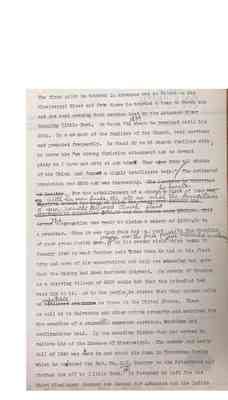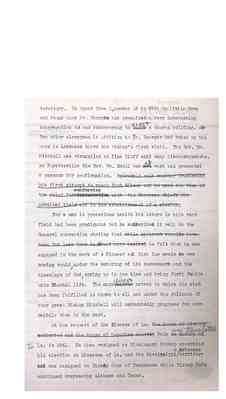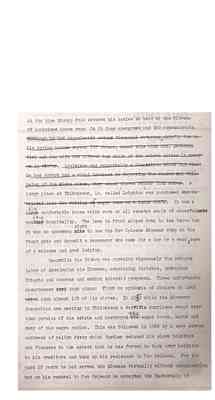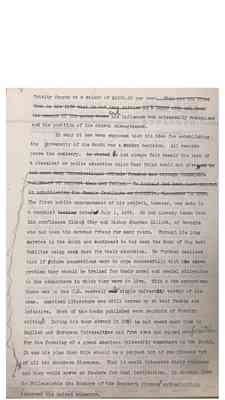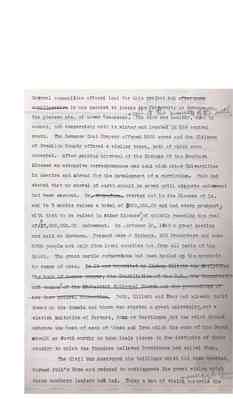Pages
16
The first point he touched in Arkansas was at Helena on the Mississippi River and from there he boarded a boat on March 4th and the next morning took another boat up the Arkansas River reaching Little Rock, On March 7th {added: 1839} where he remained until the 12th. He s aw most of the families of the Church, held services and preached frequently. He found 20 to 25 church families with{added: ,} to quote him "as strong Christian attachment and as devout piety as I have met with at any time{final letter marked out} They c{"a" replaced with "o"}me from all states of the Union and form{marked out: ed} a highly intelligent body." {slash} The estimated population was 2500 and was increasing. {Struckthrough: The location he described as healthy}. For the establishment of a church {added: he bought} a place of land {struckthrough: was {{"re" replaced with"ac"}}quired toward the cost of which the owner gave $800.00 the congregation subscribed $800.00 and the Bishop gave $800.00. This devout} with his own funds, the site on which the foundations of your recently destroyed church stand {Added: The} congregation was ready to pledge a salary of $1000.00 to a preacher. Thus it was that Polk had a part in the founding of your great Parish here. {added: which was the first parish established in Arkansas} {Paragraph marker} On his second visit{added: ation} which began in January 1840 he went further into Texas than he had on his first trip and some of his observations not only are asmusing but show that the Bishop had keen business judgment. He speaks of Houston as a thriving village of 2000 souls but that the Methodist had beat him to it. As to the people{added: ,} he states that they appear quite as {struckthrough: civilized and human} {added: respectable} as those in the United States. There as well as in Galveston and other points property was acquired for the erection of a church{added: es}and numerous services, baptisms and confirmations held. In the meantime Bishop Otey had agreed to relieve him of the Diocese of Mississippi. The summer and early fall of 1840 was s{added: p}ent in and about his home in Tennessee during which he or{illegible letter replaced with "d"}ained the Rev. Wm. H.C. Yearger to the Priesthood and started him off to Little Rock. {Paragraph marker} In November he left for his Third Missionary journey and headed for Arkansas and the Indian
17
territory. He spent from December 15 to 25th in Little Rock and found that Mr. Yearger had organized a very interesting congregation and was endeavoring to {struckthrough: build} {added: erect} a church building. Two other clergymen in additon to Mr. Yearger had taken up the wotk in Arkansas since the Bishop's first visit. The Rev. Wm. Mitchell was struggling at Pine Bluff amid many discouragements. At Fayetteville the Rev. Wm. Scull was {struckthrough: not} {added: at} work and presented 8 persons for confirmation. {Struckthrough: Extremely cold weather frustrated his first attempt to reach Fort Gibson and he used the time of the delay for {{x-ed out: conversation}} {{added and struckthrough: conferring}} with the Cherokee Chiefs who promised their aid in the establishment of a mission.}
For a man in precarious health his labors in this vast field had been prodiguous but he summarized it well to the General convention stating that {struckthrough: while apparent results have been far less than he {{"c" replaced with "w"}}ould have desired} he felt that he was engaged in the work of a Pioneer and that the seeds he was sowing would{added: ,} under the watering of his successors and the blessings of God{added: ,} spring up in due time and bring forth fruits unto Eternal life. The magn{struckthrough: animous; added: ificent} extent to which his wish has been fulfilled is known to all and under the guidance of your great Bishop Mitchell will undoubltedly progress far more rapidly then in the past.
At the request of the Diocese of La. {struckthrough: the house of Bishops nominated and the house of Deputies elected} Polk {struckthrough: as Bishop of} {added: was translated to} La. in 1841. He then resigned as Missionary Bishop accepting his election as Diocesan of La. and the Mississippi/& Arkansas territory {z-ed out: and} was assigned to Bishop Otey of Tennessee while Bishop Polk continued overseeing Alabama and Texas.
18
At the time Bishop Polk assumed his duties as head of the Diocese of Louisiana there were in it four clergymen and 222 communicants. {Struckthrough: Although he had experienced severe financial reverses{{added: ,}} chiefly due to his having become surety for others, about this time Mrs. Devereux died and his wife was offered her share of the estate either in money or in slaves. Louisiana was essentially a Plantation state and since he had always had a vital interest in improving the status and wellbeing of the slave class, they chose slaves rather than money.} A large place at Thibodeaux, La. called {added: "}Leighton{added: "} was purchased {struckthrough: and he entered into the raising of sugar cane on a large scale.}. It was a {struckthrough: large} {added: big} confortable house which wore at all seasons anair of cheerful{x-ed out: ness} hea{struckthrough: lthy; added: rty} hospitality. The lawn in front sloped down to the bayou and it was no uncommon {x-ed out: site} sight to see the New Orleans Steamer stop at the front gate and deposit a passenger who came for a day or a week{added: ,} sure of a welcome and good lodging.
Meanwhile the Bishop was pursuing vigorously the arduous labor of developing his Diocese, organizing Parishes, ordaining Priests and deacons and making splendid progress. Three unfortunate occurrences {x-ed out: duri} took place: First an epidemic of cholera in 1849 {struckthrough: which} took almost 1/2 of his slaves. In 18{"4" written over with "5"}0 while the Diocesan Convention was meeting in Thibodeaux a terrific hurricane swept over that portion of the estate and destroyed {struckthrough: his} {added: the} sugar house, barns and many of the negro cabins. This was followed in 1853 by a very severe outbreak of yellow fever which further reduced his slave holdings and finances to the extent that he was forced to turn over Leighton to his creditors and take up his residence in New Orleans. For the past 13 years he had served the Diocese virtually without compensation but on his removal to New Orleans he accepted the Rectorshop of
19
Trinity Church at a salary of $4000.00 per year {struckthrough: . This was the first time in his life that he had been settled in a large city and from the moment of his going there} {added: and} his influence was universally recognized and the position of the church strengthened.
By many it has been supposed that his idea for establishing the University of the South was a sudden decision. All records prove the contrary. {Struckthrough: As stated} {"h" changed to "H"}e had always felt keenly the lack of a classical or polite education which West Point could not give{added: .} {struckthrough: and he had seen many denominational schools founded but through inadequate endowment or support they had failed. He himself had been instrumental in establishing the Female Institute at Columbia, Tennessee in 1836.} The first public announcement of his project, however, was made in a pamphlet {struckthrough: bearing} date{added: d} {struckthrough: of} July 1, 1856. He had already taken into his confidence Bishop Otey and Bishop Stephen Elliott, of Georgia who had been his devoted friend for many years. Through his long service in the South and southwest he had seen the Sons of the best families being sent East for their education. He further realized that if future generations were to cope successfully with the slave problem they should be trained for their moral and social obligation in the atmosphere in which they were to live. With a few exceptions there was in the U.S. scarcely {struckthrough: one} {added: a} single university worthy of the name. American Literatuare was still barren or at best feeble and imitative. Most of the books published were reprints of foreign writing{added: s}. During his tour abroad in 1831 he had spent much time in English and Europeon Universities and from them had gained {added: inspiration} for the founding of a great American University somewhere in the South. It was his plan that this should be a project not of one Diocese but all of the Southern Dioceses. That it would integrate their purposes and they would serve as feeders for that institution. In October 1856 in Philadelphia the Bishops of the Southern Diocese{added: s} enthusiasticly {added: i}ndorsed the united endeavor.
20
Several communities offered land for this project but {struckthrough: after much consideration} it was decided to locate the University at Sewanee on the plateau mts. of lower Tennessee {added: & call it the University of the South.}. The spot was healthy, cool in summer, not desperately cold in winter and located in the central south. The Sewanee Coal Company offered 5000 acres and the Citizens of Franklin County offered a similar tract, both of which were accepted. After gaining approval of the Bishops of the Southern Diocese an extensive correspondence was held with other Universities in America and abroad for the development of a curriculum. Polk had stated that no shovel of earth should be moved until adequate endowment had been secured. He{struckthrough: , therefore,} started out in the Diocese of La. and in 3 months raised a total of $500,000.00 and had every prospect{added: ,} with that to be raised in other Diocese{added: s,} of quickly reaching the goal of {struckthrough: .}/a $3,000,000.00 endowment. On October 10, 1860 a great meeting was held at Sewanee. Present were 8 Bishops, 200 Presbyters and some 5000 people not only from local counties but from all parts of the South. The great marble cornerstone had been hauled up the mountain by teams of oxen. {Struckthrough: In it was deposited by Bishop Elliott the Scriptures The book of common prayer, the Constitution of the U.S., the Constitutio and cannon{{added: s}} of the Protestant Episcopal Church and the proceedings of the last general convention.} Polk, Elliott and Otey had already built homes on the domain and there was started a great university{added: ,} not a slavish imitation of Harvard, Bonn or Goettingen{added: ,} but one which should embrace the best of each of these and from which the sons of the South should go forth worthy to take their places in the destinies of their country to which the founders believed Providence had called them.
The Civil War destroyed the buildings which had been erected, burned Polk's Home and reduced to nothingness the great vision which these southern leaders had had. Today a man of vision {added: & energy, Dr Alexan Guer} controls the
